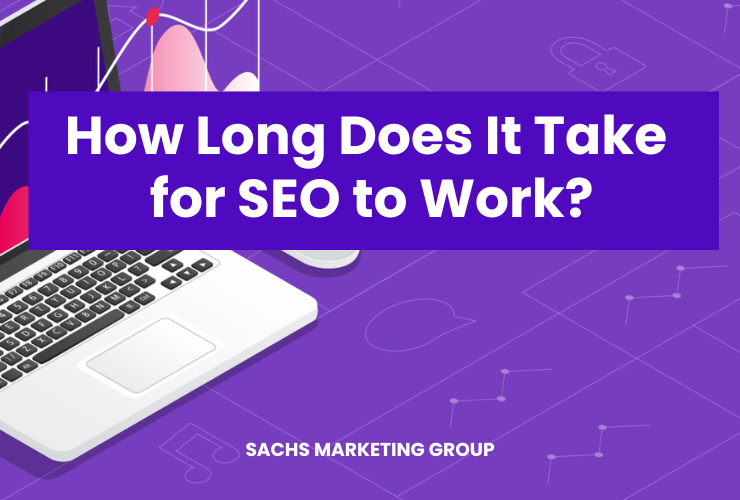How long does it take for SEO to work?
This is one of the most common questions we hear from business owners interested in deploying an efficient digital marketing strategy that helps increase website visibility and viable leads.
Search engine optimization (SEO) is a long game. While there are many strategies that you can use to improve the visibility of your website and attract more traffic, it can take months or even years before you start seeing results.
One of the main challenges with SEO is that it is constantly changing – search engines are always evolving how they rank content and what factors they consider when determining rankings. This means that you must constantly stay up-to-date with the latest trends and best practices to ensure that your SEO efforts are effective.
That being said, certain strategies can help improve your visibility immediately, such as producing high-quality content optimized for relevant keywords and regularly publishing. Additionally, working with an experienced SEO professional can help you achieve results faster, as they will deeply understand optimizing your website and getting your content in front of the right people.
At the end of the day, achieving success with SEO requires time and patience. But with the right approach, you can start seeing improvements in your rankings and traffic in a relatively short period of time. And the payoff can be huge – higher rankings and more traffic mean more potential customers and sales for your business.
If you want my team at Sachs Marketing Group to help improve your website’s organic visibility through SEO, click here.
Overview
How Long Does It Take for SEO to Work?
Frustratingly, the safest way to answer that question is “it depends.” There is no empirically perfect way to optimize a business’ online content, and the timeline between “baseline” and “better” can be weeks or months.
Some companies have done better than others in establishing their brand online and utilize multiple platforms, avenues, and forms of media to improve their ranking in an otherwise competitive field. It may take longer to make improvements in such cases, where more research, time, and data are needed to move the needle. Conversely, a young business operating in a new niche will easily break old benchmarks and gain a following because their bar starts at the floor comparatively.
Your own personal answer will depend on what you characterize as “working SEO” and what it is you are working with. Once you set a few parameters and get some actionable feedback, you can begin to learn what to expect from any given SEO campaign and how different methods might or might not work for you.
[smgquote author=”Eric Sachs, CEO”]
SEO takes time; sometimes months, sometimes years and there are many aspects that go into consideration of a campaign.[/smgquote]
Related: 4 Essential Types of SEO (You Need All Four to Succeed)
Why Should I Care About My SEO?
This industry is full of people claiming to work miracles in days. But truly effective results take time – especially in today’s SEO landscape, where it’s harder than ever to inflate numbers or utilize comparatively inefficient black-hat methods to get anywhere.
Think of SEO as any skill. Doing almost anything at all will get you results in the beginning. But the longer you’re at it, the more you need to start thinking about specificity, periodization, and proper programming. Milestones take longer to achieve, and progress becomes harder to quantify.
But objectively speaking, you know that SEO “works” when one of two things are happening:
- Your organic traffic is improving.
- Your website is rising in rankings for keywords that matter.
On the surface, SEO by itself might seem like little more than a method to improve the flow of traffic to your website. But the quality of that traffic matters, too.
Search engines like Google try to take into consideration how much time visitors spend on your site (dwell time), where they’re coming from, where they’re going, and what it is they did. Your ranking might suffer if all that data indicates that your website was enticing to visit but not interesting enough to dwell on.
That recursive sense of relevance means that SEO can also serve as a metric for your website’s success in attracting and maintaining the right crowd. Ultimately, that should result in more engagement, more following, and more sales, the goal for most businesses online.
To recap, the numbers that reflect your SEO are a fairly solid and objective measure of your business’ capacity to attract paying customers and clients, alongside your sales numbers and your financial return on investment. If improvements in the metrics that define your SEO continue to correlate with higher sales and better online business, better SEO will continue to be something you should strive for.
When is My SEO Working?
Rather than set a strict timeline how each and every method of improvement in any given SEO campaign might take to show results, we’ll simply detail how you can determine whether any given change is doing you good. This can be determined through campaign-specific goals and KPIs (key performance indicators).
Let’s try a simple example. A good goal could be beating last year’s record of online holiday sales with your new Black Friday and Cyber Monday campaigns. An admirable goal, considering the last few years have seen some record-breaking ecommerce numbers due to lockdowns and other contributing factors. If you’re selling and shipping, your products will also need to compete with major players like Amazon.
A key performance indicator might involve how well your website ranks for your target keywords, how much traffic your website attracts from search engines organically, and the number of phone calls, form submissions, or other conversions your website generates for your business.
You know your SEO is working when your campaign is meeting your goals. Goals can be subjective – it might not be realistic to try and double your numbers from last year, especially if you’re in a very competitive industry to begin with and haven’t seen much growth otherwise.
On the other hand, some businesses should absolutely expect to double their numbers, especially going from the first year to the next. Progress in your KPIs can be a lot easier to measure and quantify.
In this given example, we’re comparing one year’s results with those of the next. The improvements made aren’t just a matter of organizing a better campaign, but they reflect the cumulative progress a business has made online – attracting more loyal customers, building up the brand over a number of campaigns and activities, and generating online buzz over the past 12 months. In this given example, we’re trying to measure the progress made in a year.
A lot of other comparative work might involve shorter timeframes. You might want to see whether your SEO has improved or stagnated over a six-month period or whether measures implemented just two months ago are reflected in your rankings and traffic.
But be patient, one way or the other. It can take dozens, if not over a hundred, indexed blog posts for a business to start ranking for certain keywords. It can take a year for you to start overtaking your competition.
Why Isn’t My SEO Working?
Are you falling behind the competition? Losing clients? Dropping in traffic? Then something might be wrong. SEO best practices are never stagnant, and what worked well in 2016 probably doesn’t work quite as well today.
It can be difficult to keep up with the dizzying speeds at which SEO rules change and develop, and SEO is ultimately just one facet of improving a business’ online presence and taking advantage of the growing benefits of ecommerce.
If you want to make the most of your brand, or turn around a stagnating web presence, you need to work with the right team.
Need Help with Your SEO?
SEO is a long game that requires time and attention. At Sachs Marketing Group, we’ve got the experience and expertise to help you see positive results in your business. Our digital marketing team works together to ensure your campaign involves a strategy that adapts to what’s working and isn’t. This attention to detail ensures your website works for your business.
Call us today if you’d like to learn how Sachs Marketing Group can help your website attract more attention organically and increase conversions for your business.
Contact us today to get the conversation started!










